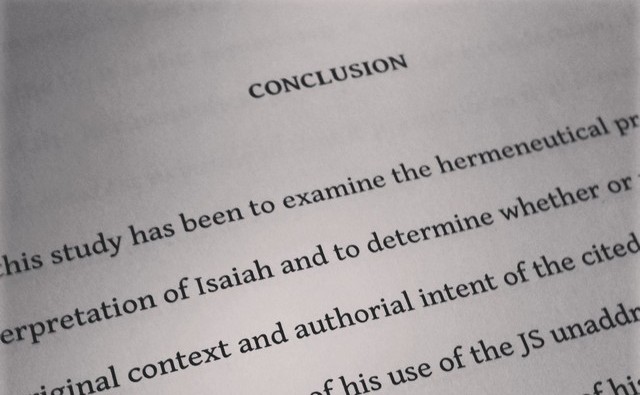I realize that “academic” and “fairy tale” really don’t belong together. Other possible titles could have been, “There and back again, a graduate student’s tale.” Or “How to turn a one-year degree into fourteen.” Maybe slightly more inspiring, “How big a dream can you dream? Part 1.”
For the past six months, I’ve been working on it. And now, I’m done. Really, done.

By ‘it’, I mean my thesis for a Master of Theology degree. Finishing this has been nothing short of a miracle, and the back story on getting to ‘done’ deserves recording for the sake of posterity.
Fourteen years ago – that’s right FOUR-TEEN years ago – while living in Seattle, I enrolled in a Master of Theology (ThM) program at Regent College, “an innovative graduate school of theology” in Vancouver, British Columbia. Had I known the journey that lay ahead, I’m not sure I would have ever ventured an application. But ignorance is bliss, so I applied and was admitted.
One thing I was aware of at the time of enrollment, Seattle and Vancouver are separated by a two-and-a-half hour drive (not to mention a national border), so I knew going in that I would be spending lots of time and gas (i.e. money) traveling back and forth between home and school. What seemed like a perfectly reasonable decision back then sounds like shear madness now. Who in their right mind would travel FIVE HOURS to attend a two hour class once a week? This idiot, that’s who.
At any rate, over the next few years, I faithfully covered the miles and more or less knocked out all the coursework. During those repeated trips to Regent, I fell in love with the school. Everything about it is just right. Where it is. What it is. Why it is. Who it is. All perfect. When people ask me what seminaries to consider, and I get asked pretty frequently, Regent is always at the top of the list.
The classes and the faculty who taught them helped me become a better theologian, pastor, and person. I already had my Master of Divinity, which was its own grueling labor of love, but for whatever reason my time at Regent was both demanding and life-giving in a way that I hadn’t experienced before. Despite the long hours driving in the car, sitting in the classroom, toiling over books and research papers, being there was a good thing for me.
Here’s what I didn’t know going in. Since the ThM is the highest degree offered at Regent, the school takes it very seriously. I have no idea what the expectations are for completing a ThM at any other school, but I’m painfully aware of what they are at Regent. High. Insanely so. I seem to recall one professor saying that since Regent didn’t offer a PhD, they more or less felt like it was their responsibility to hold students working towards their highest degree to doctoral research standards.
Just great. Not only did I have the challenges of family (I don’t think I mentioned that two of our four children were born during this time) and work to deal with, not to mention the ridiculously long commute, now I’ve got people expecting research and writing from me that I wasn’t even sure I was capable of.
I’m not sure how to describe the next several years as it relates to work on the thesis. “A wash” is probably most appropriate. I had an idea of what I wanted to write on – “1 Peter’s Use of the Old Testament” – but I discovered that it was far too broad a research topic. Now I realize that for most, this doesn’t appear to lack specificity, but alas it was indeed too vague.
Meanwhile, life is changing – more kids, moving across the country, new home, new work – and as you might guess, the thesis (that I didn’t really have a clear idea of how to finish) fell effortlessly to the bottom of the ‘do do’ list. Even though it didn’t command my attention, I knew it was there. Most days, weeks, and months would pass without even giving it a passing thought. At other times, its unfinished state was akin to Paul’s famous thorn in the flesh.
Then came the summer of 2008. I was due for a sabbatical and I had the brilliant idea of trying to combine writing a thesis and a once in a lifetime adventure for my family of six in the Pacific Northwest. Once again, sounds reasonable enough, right? Yeah, right.

The summer is well chronicled by my beloved, and I highly encourage you to spend some time reminiscing on the madness that we fondly called “living the dream.” But it didn’t take me long to realize that I wouldn’t be finishing that summer. Honestly, I would do good to come to the end of the sabbatical with a decent proposal. Humbled, but not deterred, I chipped away at the thesis while moving our make-shift home (a pop-up camper pulled by an aging 15-passenger van) from one place to the next, holing up in whatever library or coffee-shop I could find wherever we happened to be. And as expected, I walked away from the summer having made some progress on the thesis, but not much.
Returning home, the thesis returned back to the back burner. And to give the metaphor some sense of scale, it was on the very back burner of a friend’s house who lived across town that I didn’t see but a few times a year. I would wave at it every now and then, just often enough to remember it was still there. And the stove was off.
Once again, weeks, months, and years rolled by. Same ole, same ole.
Until something changed. And that something was a willingness to ask for help. On February 23, 2012, the day after Ash Wednesday, I awkwardly asked a group of men to pray with me during Lent concerning what the future held. There are a couple of pretty incredible stories there that I’ll have to go into at another time, but the short version is that at the end of Lent, we all regrouped and they affirmed that I should do whatever it took to finish the thesis. And their words of encouragement and prayers were exactly what I needed to face the challenges that lay ahead.
You see, in order for this to happen, at least four things would need to fall into place. First, the leadership at church would need to be willing to let me take the time to do the research and writing. Second, I would need to seek and be granted an extension from Regent. Third, I would need to secure a new thesis supervisor from among the faculty at Regent (by this time, my previous supervisor had left the school). And fourth, I would need to find a way to have access to highly specialized theological books and articles, which I knew would prove difficult because Central Arkansas doesn’t boast much in the way of theological libraries.
I honestly wasn’t sure that any of these things would come to pass. The only hope I was going on was that a group of four friends were convinced that this was the course I needed to take. And so one step at a time, I walked through the process. And one by one, the mountains moved. The church made it possible for me to devote a significant amount of time each week to thesis work. Regent was gracious enough to grant the necessary program extension. Two down, two to go.
Securing a thesis supervisor was going to be a little tricky. The most likely candidate for supervising was a New Testament professor who is something of an expert in the New Testament’s use of the Old. However, he was on study leave and therefore unavailable. Enter Mariam Kamell, a recent addition to Regent’s faculty who had recently finished her PhD work in New Testament. After a round of emails and a phone call or two, she agreed to supervise my work. More on Mariam later, but for now just ‘one’ to go.
I was fully prepared to make regular trips to Regent (at no small expense), in order to have access to the library, which is one of the finest theological libraries in North America. Then Alison suggested that I at least check with our local library to see what they might be able to do for me. My acting on her suggestion (and Lord knows that I don’t always take her advice to heart) was the difference maker. I discovered a little thing called ILLIAD. I don’t know exactly what it stands for, but the words “inter-library” and “loan” are somewhere in there, and basically what it means is that any book or article on the planet can find its way into my hands within a week or two. And I mean… any book. FOR FREE! My friends, the world had just opened up to me. I don’t know how many requests I’ve made in the last six months, but I would venture to guess somewhere approaching one-hundred.
So with the obstacles (and excuses) out of the way, the only thing left keeping me from getting it done was me. Literally, everything had fallen into place and now I had to face the unfortunate truth that I am my own biggest obstacle to getting most anything done. However, having reached the proverbial point-of-no-return, stopping now was not option. It helped that there were four guys who would have taken me to task if I gave any indication at all of not moving forward. And so, I took the next step.
It is now May of 2012, I send off the proposal that I had thought was in pretty good shape to my recently acquired supervisor. At this point, I should clarify what the “proposal” stage is all about. In most peoples’ minds, a proposal is a few paragraphs – a page at best – describing what you think you would like to write about. Someone signs off on that and then you get to go write your thing. At Regent, a proposal is a carefully researched, fully annotated, highly scrutinized, twenty-five page document detailing what you plan to argue as original research. This ain’t no book report folks. It isn’t even a summary of what you’ve learned after reading a couple hundred books and articles. It is you saying something that has never been said before about the Bible. The B-I-B-L-E. Only the most studied piece of literature in the history of the planet.
Mariam has many wonderful qualities that make her an ideal supervisor, and none more important than her honesty. After having read through the proposal, her candid (yet gracious) reply was along the lines of “you’re going to have to do better than that.” This was right before summer hit, and so her reply coupled with the irregularity of summer schedule set me back over two months. When August rolled around, I knew that unless I jumped back in now, I would probably be looking at another multi-year stand still. So I took the next step. Dove back in. Did more research. Carefully considered her feedback. And began to re-work the proposal.
I barely make a deadline for turning in my proposal to an approval committee. That’s right, a committee approves whether or not your proposal has any merit. No pressure. It came back and the hard work paid off. I was given the ‘green light’ to get moving. That happens at the end of November. The agreed upon due date is March 25th. I’ve got just under four months to produce one hundred and twenty-five carefully researched, well-argued, pages of fresh research on 1 Peter’s Use of Isaiah (yes, the Old Testament was too broad, so it got narrowed down to just the Isaiah references).
And that’s when things shifted into high gear. For four months, every week, I churned out page after page. Once a chapter was done, I sent it off to my supervisor and she would take it to task. Comments regularly came back, “not sure what you’re arguing here,” “awkward sentence,” “where are you going with this.” I would revise. All the while, keeping moving forward. And slowly, chapters were finishing and an argument was coming together. I would stare at my laptop until it felt like my eyes were going to fall out of my head. But finally, one day, I was done. Just like that. And not only done, but done with a piece of well-researched, carefully argued, and I think, important contribution to the field of biblical studies.

Last weekend, I had the privilege to attend convocation in Vancouver. I’ve never been one given to ceremony, fanfare, or sentimentality. However, walking across that stage brought to conclusion something that was definitely worth marking and celebrating. It was a watershed moment that I’ll always look back on to remember that sometimes the faithfulness of God takes many, many years to recognize. In our “on-demand” culture, I feel like this is a much needed reminder.
Like I said at the outset, it is nothing short of a miracle. And by and large, the miracle came in the form of people. People who gave exactly the sort of support and encouragement that I needed at exactly the right time and place. Maybe one day, I’ll learn that lesson for good.
And yet, my friends, getting to ‘done’ is not even half of the story.










